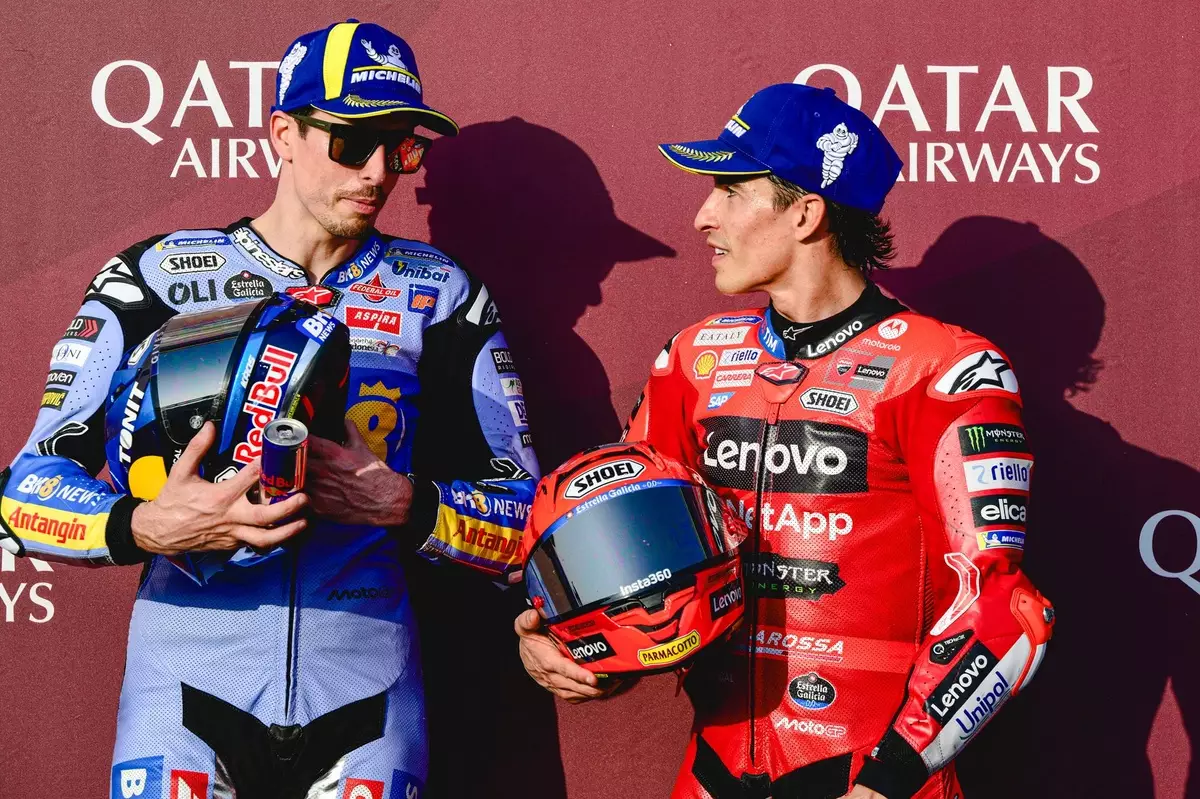The Qatar Grand Prix was not just another race; it was a high-octane drama, underscored by familial rivalry and a brush with the edge of competitive ethics. Marc Marquez, a seasoned competitor in the MotoGP arena, found himself in the thick of controversy when a collision with his younger brother, Alex Marquez, unfolded at the very first corner. While the collision itself could have easily been a footnote in the chaos of racing, it has instead ignited a dialogue about responsibility, accountability, and the inherent dangers of competitive motorsport.
Marc, who started from pole position and established an early lead, made an unexpected move as he exited the first corner. Attempting to manage his bike’s power, he inadvertently cut across the line of Alex, resulting in contact that caused minor damage to both Ducatis. The crash did more than just mar their machines; it shifted the dynamics of the race, allowing VR46’s Franco Morbidelli to slip past in a calculated maneuver that put him into an unexpected lead.
In this instance, one has to consider: was Marc’s decision to throttle down an error in judgment indicative of a wider issue confronting riders at high speeds? His self-reflection post-race suggests a deeper understanding of such critical moments. “I opened the gas and I felt like the rear was going, so then I closed the gas again,” Marc reflected candidly. This incident not only altered the trajectory of the race but might serve as a vital learning moment for other riders who face similar pressure-packed scenarios.
The Ripple Effect on Alex
For Alex, however, the repercussions of this brief clash were more severe. Initially, the incident stalled his pace, impacting his confidence and momentum. The subsequent laps saw him struggling to regain his rhythm, losing invaluable positions as he grappled with the fallout from his brother’s error. Matters worsened when he collided with Fabio di Giannantonio, a misjudgment that not only led to a penalty but also dimmed his prospects of finishing the race on a high note.
In the world of MotoGP, the fine line between aggressive racing and reckless behavior becomes glaringly apparent, especially in Alex’s admission of fault. His acknowledgment, “It was my mistake, it’s my responsibility,” struck a chord of authenticity, shedding light on a culture where riders must often bear the weight of their mistakes in front of a global audience. The competitiveness within the Marquez brothers could easily have escalated frustrations, yet both racers demonstrated a level of sportsmanship that is often overshadowed by the adrenaline of competition.
Lessons in Accountability
The dual admissions of responsibility bring to light a critical aspect of racing: accountability. In moments of high stakes and intense competition, the ability to reflect and admit one’s mistakes is not just commendable but essential. Mistakes can lead to dangerous situations on the track, and as di Giannantonio pointedly remarked, it’s a fine line that separates what’s acceptable from what goes beyond it.
With di Giannantonio expressing his discontent over the collision, one cannot help but ponder the nuances of racing etiquette in MotoGP. While competition is fierce, there exists an unspoken agreement among riders—a moral code if you will, surrounding respect and safety. The sentiment that such mistakes should be reserved for the junior leagues highlights a desire for higher standards at this elite level of sport. It begs the question: should stricter consequences be enforced for unsafe maneuvers, particularly those that involve clear misjudgments?
Looking Forward: A Balanced Perspective
The aftermath of the Qatar Grand Prix sets the stage for an intriguing dialogue about safety and sportsmanship in MotoGP. As competition continues to intensify with each passing race, lessons from such incidents will undoubtedly ripple through the paddock. Both Alex and Marc Marquez’s willingness to accept their roles in the day’s events highlights the importance of resilience—a necessary trait to thrive amidst the trials of racing.
Such reflections are not merely academic; they serve to inspire future generations of riders navigating the unforgiving circuits of MotoGP. As the Marquez brothers take to the track again, fans and fellow competitors alike will watch closely, not only for their racing skills but for the manner in which they carry the weight of their experiences into future contests. The balance of familial support and fierce competition may redefine what it means to be not just a racer, but a responsible member of the racing community.

